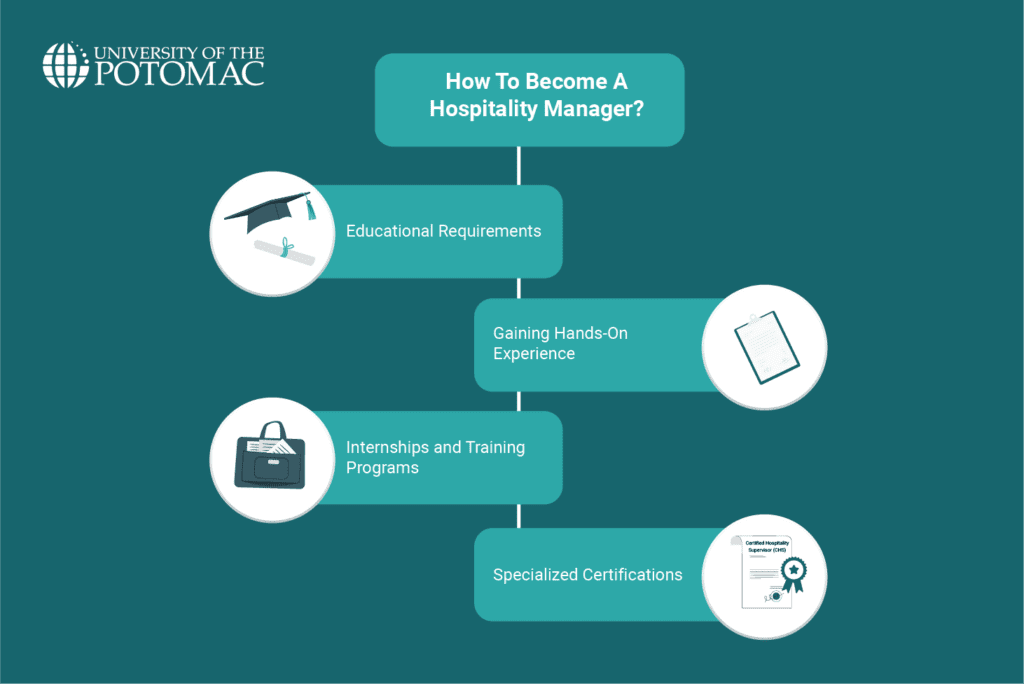How to Become a Hospitality Management Expert: Steps
Imagine a career where your passion for helping others meets your love for creating memorable experiences. Hospitality management offers just that.
Whether it’s managing a bustling hotel, orchestrating a seamless event, or ensuring a memorable dining experience, this field is all about making people feel welcomed and valued. You might be wondering how to step into this exciting world and build a successful career.
Good news—you’re in the right place. This guide will walk you through the essential steps, skills, and insights you need to turn your dream into reality. Ready to discover how you can transform your passion for hospitality into a thriving career? Keep reading, and let’s unlock the secrets to becoming a hospitality management pro.
Education And Training
Pursuing a career in hospitality management starts with relevant education. Enroll in hospitality courses to gain foundational skills. Internships provide hands-on experience in real-world settings. Seek positions in hotels, restaurants, and event planning to build expertise. Networking with industry professionals can enhance career opportunities.
Embarking on a career in hospitality management is an exciting journey filled with opportunities to lead and innovate in the vibrant world of hotels, restaurants, and events. To get started, education and training play a pivotal role. They provide you with the essential skills and knowledge needed to excel in this dynamic industry. Let’s explore the educational pathways that can help you thrive.
Degrees And Certifications
Pursuing a degree in hospitality management is a solid step to kickstart your career. Many universities offer specialized programs that cover everything from hotel operations to guest relations. These programs often include internships, giving you real-world experience and a chance to connect with industry professionals. Consider obtaining certifications to boost your credentials. Certifications like Certified Hotel Administrator (CHA) or Certified Hospitality Supervisor (CHS) can set you apart. They demonstrate your commitment and expertise, opening doors to leadership roles.
Online Courses And Workshops
Online courses offer flexibility and convenience, especially if you’re balancing work or other commitments. Platforms like Coursera and Udemy provide courses taught by industry experts, allowing you to learn at your own pace. These courses often focus on niche areas such as sustainable hospitality or digital marketing in tourism. Workshops are another excellent way to gain hands-on experience. They often focus on practical skills like customer service excellence or event management. Participating in workshops can also expand your network, connecting you with peers and mentors who share your passion. Are you ready to take the first step toward a rewarding career in hospitality management? Consider which educational path aligns best with your goals and start learning today.

Developing Essential Skills
Gaining experience in hospitality management involves mastering communication, teamwork, and customer service. Understanding the industry standards and leadership skills is crucial. Practical knowledge and adaptability ensure success in a dynamic environment.
Developing essential skills is crucial on your journey to becoming a hospitality management professional. These skills are not just about knowing the ins and outs of the industry. They are about mastering the art of interacting, resolving, and exceeding expectations.
Communication And Leadership
Strong communication is the backbone of hospitality management. You need to convey clear messages to your team and guests. Effective communication is not just about speaking; it’s about listening actively and responding appropriately. Leadership goes hand in hand with communication. As a leader, your team looks to you for guidance and inspiration. Sharing a personal experience: I once had a team member struggling with a task. By simply asking how I could assist, I opened a dialogue that led to a more efficient workflow. How can you foster better communication and leadership in your environment today?
Problem-solving And Decision-making
Daily challenges in hospitality require sharp problem-solving skills. Whether it’s handling a double-booked room or a dietary request, quick thinking is essential. The ability to assess a situation and make informed decisions can set you apart. Decision-making is not just about choosing the right option. It’s about evaluating potential outcomes and being accountable. Reflect on a recent decision you’ve made. What impact did it have on your team or guests?
Customer Service Excellence
Exceeding customer expectations is the heart of hospitality. Every interaction with a guest is an opportunity to create a memorable experience. Simple gestures, like remembering a guest’s name, can make a huge difference. Customer service excellence is about anticipating needs and delivering beyond what’s expected. During my early days in hospitality, a guest mentioned their fondness for a particular tea. I ensured it was available in their room throughout their stay. Their smile was priceless. What small actions can you take to enhance your customer’s experience today? Develop these skills with passion and dedication, and you’ll find yourself well on the way to a rewarding career in hospitality management.
Gaining Practical Experience
Gaining practical experience is a cornerstone in the journey to becoming a successful hospitality manager. You can have all the theoretical knowledge, but real-world experience truly molds your ability to handle the dynamic environment of hospitality management. Dive into hands-on experiences that bring life to your learning and prepare you for the challenges ahead.
Internships And Entry-level Positions
Internships are a golden opportunity to test your skills in the hospitality field. They allow you to work directly with seasoned professionals and absorb their wisdom. By starting as an intern, you get a peek into the industry’s inner workings without the pressure of full-time responsibilities.
Entry-level positions like front desk associates or event coordinators are perfect stepping stones. They provide a broad exposure to various aspects of hospitality management. From these roles, you can learn invaluable skills such as customer service, communication, and team coordination.
Don’t shy away from asking questions and seeking feedback during these experiences. Active engagement helps you learn faster and adapt to the industry’s demands.
On-the-job Learning Opportunities
Real-time learning on the job is where theory meets practice. As you encounter different situations, you develop problem-solving skills that no textbook can teach. Each challenge presents a chance to refine your management style.
Observe how experienced managers handle crises and decision-making. Their strategies can provide you with insights on improving your own approach. Think about how you would handle similar situations and ask yourself what you might do differently.
Consider the importance of networking during your practical experience. Building relationships with colleagues and industry professionals can open doors to future opportunities. How can you leverage your growing network to advance your career?
Networking In The Industry
Networking in the hospitality industry opens doors to new opportunities. It helps build connections that can enhance your career. Engaging with professionals and peers can lead to valuable insights. Networking is key to staying updated and competitive.
Building Professional Relationships
Start by attending events where industry professionals gather. Conferences and workshops are great for meeting new people. Approach conversations with genuine interest and curiosity. Listen actively to others and share your experiences.
Follow up with new contacts after initial meetings. A simple message can strengthen connections. Consistent communication helps build trust. Use social media platforms like LinkedIn to stay connected. Interact with posts and share relevant content.
Joining Industry Associations
Industry associations offer numerous networking opportunities. They host events, webinars, and discussion forums. Joining these groups increases your visibility. It also exposes you to industry trends and practices.
Participate actively in association activities. Volunteer for committees or special projects. This involvement showcases your commitment and expertise. Associations often provide resources and support for career development.
Being part of a community fosters collaboration. It enables learning from experienced professionals. Associations can help you find mentors and advisors. These relationships are invaluable in advancing your career.
Staying Updated With Industry Trends
Staying updated with industry trends is crucial for success in hospitality management. The industry evolves rapidly, with new technologies and practices emerging often. Managers must stay informed to provide top-notch service and maintain a competitive edge. Learning about trends helps anticipate customer needs and improve service offerings. It also ensures that hospitality managers can make informed decisions and foster innovation in their establishments.
Attending Conferences And Seminars
Conferences and seminars offer valuable insights into the hospitality industry. They are perfect for learning about the latest trends and technologies. Attendees can hear from industry leaders and experts. Networking opportunities abound, providing chances to connect with peers. These events often feature workshops and panels. Participants can exchange ideas and learn from each other’s experiences. Staying engaged in these settings keeps managers updated and inspired.
Subscribing To Industry Publications
Industry publications are a treasure trove of information. They cover the latest trends and developments in hospitality management. Subscribing to these publications ensures regular updates. Articles often include expert opinions and case studies. Reading them helps managers understand market dynamics and consumer preferences. Digital formats make it easy to access content on the go. Regular reading habits foster continual learning and growth.
Advancing Your Career
Pursue a hospitality management career by gaining relevant education and hands-on experience. Develop strong communication and leadership skills to excel. Networking with industry professionals can open doors to new opportunities.
Advancing your career in hospitality management opens up exciting opportunities. The industry constantly evolves, offering diverse paths for growth. Aspiring professionals can explore various routes to climb the career ladder. By focusing on advanced roles and further education, one can thrive in this dynamic field.
Pursuing Advanced Roles
Stepping into advanced roles involves gaining significant experience. Start by mastering the basics of hospitality operations. Build strong relationships with colleagues and mentors. Showcase leadership skills and take on challenging tasks. Management positions often require excellent communication and problem-solving abilities. Aim to lead teams and manage large-scale projects. Networking within the industry can also lead to new opportunities.
Continuing Education And Specializations
Continuing education is crucial for career advancement. Enroll in hospitality management courses or workshops. These can enhance your knowledge and skills. Specializations in areas like event management or food service can be beneficial. Certifications add value to your resume and highlight expertise. Stay updated with industry trends and technologies. This knowledge can set you apart from competitors.
Embracing Technology
In the fast-paced world of hospitality management, embracing technology is not just an option; it’s a necessity. As we move into an era where digital solutions shape guest experiences, understanding how to leverage technology becomes crucial. It’s about finding smart ways to enhance operations, attract more visitors, and provide exceptional service.
Utilizing Hospitality Management Software
Hospitality management software is the backbone of modern hotel operations. These tools streamline everything from reservations to guest feedback. They allow you to manage tasks efficiently, keeping everything organized and accessible.
Imagine the ease of tracking bookings in real time or automating check-ins. Software solutions can help you do this seamlessly. By reducing manual effort, you can focus more on creating memorable experiences for your guests.
Explore options that offer analytics to understand customer preferences. This data-driven approach helps tailor services to individual needs, fostering loyalty and repeat business. Are you ready to make data your ally in hospitality?
Adopting Digital Marketing Strategies
In the digital age, marketing your hospitality business online is a game-changer. Embrace platforms like social media and email campaigns to reach a wider audience. These tools offer cost-effective ways to promote your brand.
Craft engaging content that speaks to potential guests. Share stories that highlight unique aspects of your service. Use visuals to capture attention and showcase your offerings.
Implementing SEO practices ensures your website ranks higher in search results. This increases visibility, bringing more traffic and potential bookings. Are your digital marketing strategies keeping pace with today’s trends?
Staying ahead in hospitality requires a blend of traditional service excellence and cutting-edge technology. Are you ready to transform your approach and elevate your b
Cultural Awareness And Diversity
In hospitality management, understanding cultural awareness and diversity is crucial. It enhances guest experiences and fosters an inclusive environment. Recognizing cultural differences helps create a welcoming atmosphere. Embracing diversity ensures everyone feels valued and respected. This skill is essential for building strong relationships with guests and colleagues.
Understanding Global Cultures
Hospitality managers often work with diverse groups. They must understand global cultures to succeed. Learning about different traditions and customs is important. It helps in anticipating guest needs and preferences. Being aware of cultural nuances can prevent misunderstandings. This knowledge builds trust and rapport with guests.
Implementing Inclusive Practices
Inclusive practices in hospitality management improve guest satisfaction. They involve creating accessible spaces for all. Diverse menus and services cater to different cultural preferences. Training staff in diversity awareness is key. It ensures they treat all guests with respect. Small gestures like using preferred names make a big impact. These practices create a welcoming environment.

Frequently Asked Questions
What Skills Are Needed For Hospitality Management?
Hospitality management requires strong communication, leadership, and problem-solving skills. Being customer-focused and adaptable is crucial. Knowledge of industry trends and technology also plays a vital role. You should be able to manage finances and understand business operations to ensure smooth and efficient service delivery.
How Long Does It Take To Study Hospitality Management?
Studying hospitality management typically takes two to four years. Programs vary, offering diplomas, associate degrees, or bachelor’s degrees. Internships are often included for practical experience. Shorter certification courses are available if you need specialized knowledge in specific areas like event planning or culinary arts.
Is Hospitality Management A Good Career Choice?
Hospitality management is a rewarding career with diverse opportunities. It offers roles in hotels, resorts, restaurants, and event planning. The industry is growing, providing job security and potential for advancement. You can enjoy dynamic work environments and the chance to meet people from around the world.
What Are The Job Prospects In Hospitality Management?
Job prospects in hospitality management are promising. The industry is expanding globally, demanding skilled professionals. Opportunities range from hotel management to event coordination. With experience and expertise, you can advance to senior positions. Networking and continuous learning enhance career growth prospects.
Conclusion
Pursuing a career in hospitality management offers many exciting opportunities. You need passion, dedication, and the right skills to succeed. Start by gaining experience in the hospitality industry. This will help you understand the field better. Education is important too.
Consider enrolling in hospitality management courses. Networking with industry professionals can open doors. Always stay updated with the latest trends. This keeps you competitive. Remember, hard work and a positive attitude go a long way. With these steps, you can build a successful career.
Enjoy the journey towards becoming a hospitality management professional.





